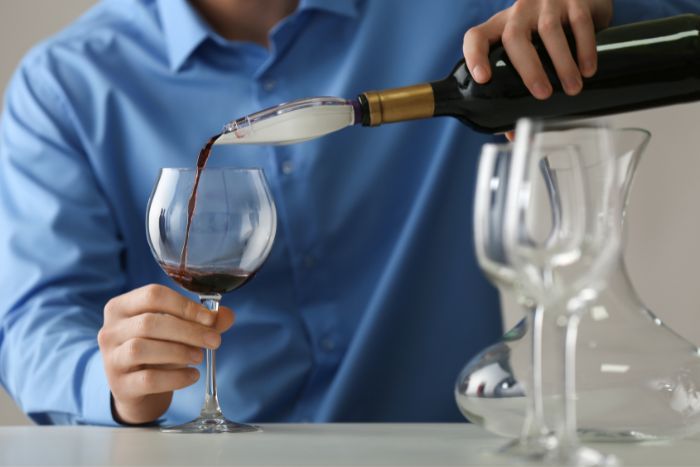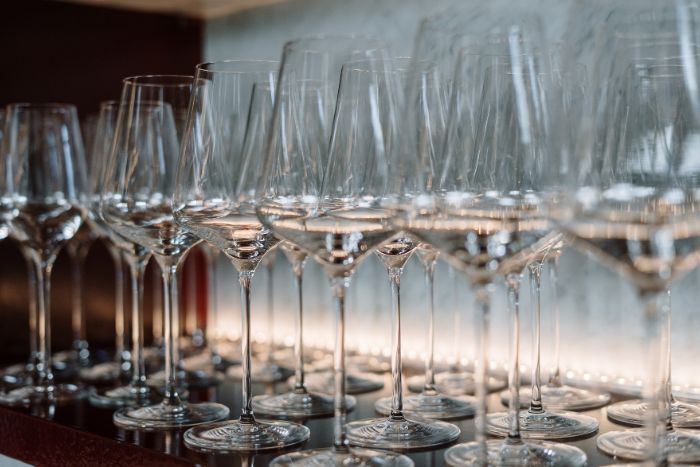Would you pay £1,000 for a glass of wine? This is the world of extreme glassware.
Discover why some wine lovers invest more in the glass than in the bottle.

What if we told you that there is a wine glass more expensive than most of the bottles you have ever tasted in your life?
It is not made of gold, nor does it have diamonds. It is fine crystal, hand-blown and designed down to the last millimetre. And for some, it is as important as the wine it contains.
Today, we dive into the fascinating world of extreme glassware. A world where glass is not a container, but a sensory tool. Does it make sense to pay so much for a glass? Let's find out.
The argument: it's not just a glass, it's part of the wine
For wine lovers, every detail matters. From temperature to decanting. And yes, even the shape of the glass.
High-end manufacturers don't just create beautiful objects; they also craft exceptional experiences. They design pieces that channel aromas, control oxygenation, and direct the wine to the exact point on the tongue so that every nuance is expressed with surgical precision.
And what happens when you take that perfectionism to the extreme?
Zalto, Riedel, Josephinenhütte: when glass becomes art
Zalto Denk’Art is perhaps the most respected name in this field. Its glasses are so thin that they seem to disappear between your fingers. Each one is hand-blown in Austria, lead-free, and with a geometry inspired by astronomical proportions. No joke. A set of six can cost around £400, and limited editions far exceed that price per unit.
Riedel, meanwhile, is the pioneer in varietal design. They created specific glasses for each grape variety: one for Pinot Noir, another for Syrah, another for Nebbiolo. The Sommelier series, their most exclusive line, raises the bar even higher in terms of price and detail, costing £110 per unit.

And then there is Kurt Josef Zalto, the man behind the legendary brand, who founded Josephinenhütte after leaving. His new creations, such as the Josephine No. 3, are causing a stir among sommeliers. There is talk of radical elegance and technical sensuality. And yes, they cost more than £150 each.
Does it really change the experience?
It depends on who you ask.
For a professional taster, the difference is clear. A good glass amplifies aromas, softens or highlights the structure, and allows you to perceive details that a standard glass simply silences.
For the amateur, the change is more emotional than technical. Drinking a great wine in an exceptional glass feels different. More intimate. More special. It's not just about the taste, but the feeling of holding something delicate, made with intention, that turns the act of drinking into a ritual.
When does it make sense to invest in a premium glass?
You don't need to spend £1,000 to enjoy a glass of wine. But if you open special bottles, share tastings with friends or simply love to treat yourself from time to time, a good glass can change your relationship with wine.
Imagine opening a 30-year-old Barolo or a great Châteauneuf-du-Pape and serving it in a thick, shapeless "kitchen glass". Doesn't it lose some of its magic?
The right glass is not an unnecessary luxury. It's part of the experience.
What if I want to improve without breaking the bank?
Good news: there are excellent options for less than you might think.
Brands such as Spiegelau, Lehmann, and even the Riedel Veloce range offer high-quality, lightweight, elegant, and perfectly balanced varietal glasses for £15–£25. They are durable, dishwasher-safe (although we don't recommend it), and, above all, respectful of the wine.
At Vinissimus, we don't sell glasses, but we can help you find the perfect wine for this type of glassware: expressive, complex and worthy of being heard in its entirety.
The secret that few admit
The most expensive glasses are fragile. Some don't fit in normal display cabinets. They need to be washed by hand with warm water and no detergent. And yes, if you drop them, they break.
But those who use them say that once you've tasted a great wine in a Zalto or Josephine glass, it's hard to go back.
It's not so much what you see or smell, but how it makes you feel.
What wine fills a glass like this?
Not just any bottle will do.
If you have a special glass, you need a special wine. In our shop, you'll find selections designed just for that: grand reserves, limited editions, bottles with history.
Discover our wines for special occasions:
£10
Special offer available for a minimum purchase of £99. Discount voucher valid for four weeks from issue date. Cannot be used in conjunction with other promotions except for the free delivery special offer.
You may not buy a £1,000 glass. But after reading this, you might think twice about the next glass you raise to toast.
Because sometimes, luxury is in the invisible details. Like the almost imperceptible rim of a glass that doesn't distract, but lets the wine shine.
And that, my friend, is a luxury that is truly worth it.
FAQs
What is the difference between red wine glasses and white wine glasses?
Red wine glasses are wider and have a longer stem, which allows the wine to breathe and release its aromas. White wine glasses are narrower and taller, which helps keep the wine cool.
Is it necessary to use specific glasses for each type of wine?
Although not strictly necessary, using glasses designed for each type of wine can enhance the tasting experience by highlighting the specific aromas and flavours of each variety.
How should I clean my wine glasses?
It is recommended to wash the glasses by hand with warm water and a mild detergent. Avoid using abrasive scouring pads and dry with a soft cloth to prevent scratches.
Can I use glass wine glasses for other types of drinks?
Yes, glass wine glasses can be used for other drinks, although their design is optimised for wine. However, it is always good to keep in mind that some drinks may affect the taste of wine if the same glasses are used.
What is the ideal capacity of a wine glass?
The ideal capacity of a wine glass varies, but generally ranges from 300 ml to 600 ml. This allows you to pour the right amount without filling the glass completely, leaving room for the wine to breathe.
Is it better to use crystal or glass wine glasses?
Crystal glasses are usually thinner and more elegant, which can enhance the tasting experience. However, glass is more durable and less likely to break.
How can I prevent my glasses from getting scratched?
To prevent scratches, store your glasses in a place where they will not come into contact with other hard objects. It is also advisable to use a soft cloth when cleaning or drying the glasses.
__________________
You may also be interested in:
- 3 Tips for Perfect Wine Serving Temperature
- Wine Etiquette: Dos and Don'ts
- Italian Rosé Wine: An Exquisite Blend of Tradition and Taste
- Cava Cocktails and Mixology
- Best Red Wine to Drink Without Food








